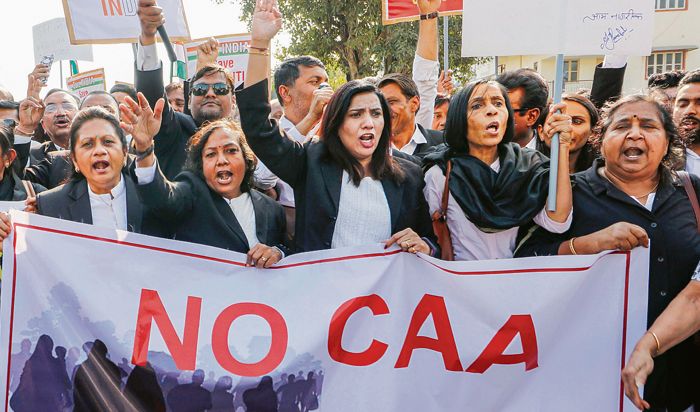
Abhijit Bhattacharyya
Advocate, Supreme Court
An Indian law, the Citizenship Amendment Act (CAA), is being contested by a rank outsider ‘world body’, the United Nations High Commissioner for Human Rights (UNHCHR), purportedly representing global ‘interests’.
Contextually though, one doesn’t have any issue with the UNHCHR flagging its concern on India’s action (initiated through an Act of Parliament) and moving the Supreme Court, but one wonders whether the UN body expressed apprehension in the past and intervened in the internal affairs of three countries which constitute the focus of the CAA. Did the UNHCHR ever apply the same yardstick during unfolding developments in Afghanistan, Bangladesh and Pakistan?
Diplomats are likely to miss nuances of constitutional law of the nation as and when municipal law is brought face to face with international law on the high table. Let’s, therefore, go through the basics of two laws: municipal and international law — as defined by, and universally accepted, Black’s Law Dictionary. The former is “internal law of a nation, as opposed to international law.” The Constitution of India, being the internal/municipal law of the nation, is “opposed to international law”, and hence vice versa. Of course, “opposed to” doesn’t mean, or create, an enmity between the two laws; instead, it clarifies with utmost care that the two laws are separate, and not inseparable, and hence cannot intrude into each other’s territory. They certainly aren’t necessary and complementary to each other. It could be a matter of subjective convergence at times, but it certainly cannot be an indisputable objective reality all the time.
International law is described thus by Black’s Law Dictionary: “The legal system governing the relationship between nations; more modernly, (beginning 18th century) the law of international relations, embracing not only nations but also such participants as international organisations and individuals (such as those who invoke their human rights or commit war crimes).” Also, termed “public international law; law of nations; law of nature and nations; jus gentium (Latin for law of nations). The body of law, taken to be common to all civilised people, and applied in dealing with the relations between Roman citizens and foreigners); foreign relations law; inter-state law; law between states (the word ‘state’, in the latter two phrases, being equivalent to nation or country).”
Coming to CAA, let’s be clear that the law has been made by Parliament of sovereign India. Parliament is the creation of the Constitution which, in turn, came into effect on January 26, 1950, through the Constituent Assembly which sat from December 9, 1946, to December 9, 1949. Thus speaks the Preamble to the Constitution: “We, the people of India... in our Constituent Assembly this twenty-sixth day of November, 1949, do hereby adopt, enact and give to ourselves this Constitution.”
One of the most prominent chapters of this Constitution is Part III containing Fundamental Rights spanning Articles 12 to 35. Citizenship doesn’t fall under Fundamental Rights, but under the preceding Chapter II: Articles 5 to 11. It must be noted that citizenship cannot be claimed as a Fundamental Right by any non-Indian on the plea of discrimination, especially one not an ‘original/by birth inhabitant’ of India.
Before 1947, too, there was India, a bigger one. If a pre-1947-born Indian comes to post-1947 India, can he/she be stopped as being foreigner/intruder/illegal immigrant? This fundamental issue creates the biggest hassle for political parties owing to different interest groups, besides the multi-dimensional polity of the subcontinent.
India has faced a perpetual problem of minorities fleeing Afghanistan, Bangladesh and Pakistan. It has always been an extremely complex scenario: first, the influx of non-Muslims from these Muslim-dominated neighbouring nations, and subsequently Muslims, into India.
Regarding the CAA, it began with the Citizenship Act, 1955, which today stands as the Citizenship (Amendment) Act, 2019. Of the original Act’s 19 sections, 15 remain intact. Four sections have been amended: 2, 6B, 7D and 18; and of the four Schedules, the third has been amended.
The amendment to the Third Schedule provided that for a person belonging to Hindu, Sikh, Buddhist, Jain, Parsi or Christian community in Afghanistan, Bangladesh or Pakistan, the aggregate period of residence or service of Government of India as required under this clause shall be read as ‘not less than five years’ in place of not less than 11 years.
Understandably, the omission of the word ‘Muslim’ has led to allegations of violation of Article 14 (equality before law) of the Constitution. The Article says: “The State shall not deny to any person equality before the law or the equal protection of the laws within the territory of India.”
Clearly, Article 14 constitutes the fulcrum of the CAA, revolving around the words: ‘within the territory of India’. Since Kabul, Islamabad and Dhaka don’t fall ‘within the territory of India’, no act of ‘equality’ or ‘discrimination’ would fall under the purview of the Indian Constitution as the entire matter gets shifted to the External Affairs Ministry’s policy decision: “whom to give/grant visa/citizenship and whom to reject.” Thus, whereas Taslima Nasreen, a Bengali Muslim from Dhaka, is repeatedly denied Indian citizenship, a Muslim Pakistani Air Force officer’s son, Adnan Sami, is granted citizenship. Both are Muslims. One welcome. The other unwelcome. Hence, to challenge the CAA on the grounds of violation of the Constitution may not be easy because, in the end, it’s the privilege of the State to grant citizenship to a foreign national. That’s international law. It’s hard to comprehend how it can fall under the ambit of municipal law.
Join Whatsapp Channel of The Tribune for latest updates.




























